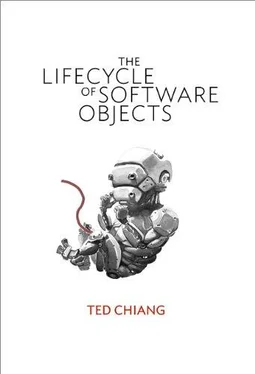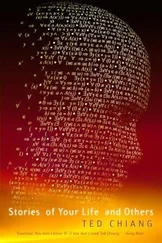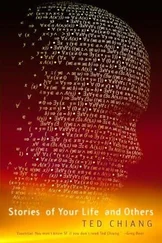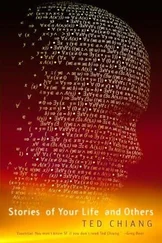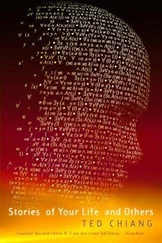“Like a Neuroblast version of InstantRapport,” says Ana.
“Something like that,” says Chase, “but more effective and specific, because it’ll be custom-tuned. For the digient, it will be indistinguishable from falling in love spontaneously.”
“That custom-tuning doesn’t sound like something you’ll be able to get right on the first try,” says Ana.
“No, of course not,” says Chase. “We expect that it will take months for a digient to fall in love; throughout that period we’ll be working with the customer, rolling the digient back to checkpoints and trying different adjustments until the emotional bond is firmly established. It’ll be like the breeding program you managed when you worked at Blue Gamma; we’re just tailoring it for the individual customer.”
Ana’s about to say that it’s very different, but decides not to. All she needs to do is listen to the woman’s sales pitch, not refute it. “I can see what you mean,” she says.
Derek says, “Even if you can make them fall in love, none of our digients is going to be a convincing Marilyn Monroe.”
“No, but that’s not our goal. The avatars we’d give them would be humanoid, but not human. You see, we’re not trying to duplicate the experience of sex with a human being; we want to provide non-human partners that are charming, affectionate, and genuinely enthusiastic about sex. Binary Desire believes this is a new sexual frontier.”
“A new sexual frontier?” says Stuart. “You mean popularizing a kink until it becomes mainstream.”
“You could call it that,” says Chase. “But try looking at it another way: our ideas of what constitutes healthy sex have always broadened over time. People used to think homosexuality, BDSM, and polyamory were all symptoms of psychological problems, but there’s nothing intrinsic about those activities that’s incompatible with a loving relationship. The problem was having one’s desires stigmatized by society. We believe that in time, digient sex will likewise be accepted as a valid expression of sexuality. But that requires being open and honest about it, and not pretending that a digient is a human.”
An icon appears onscreen indicating that Chase has transmitted a document to the group. “I’m sending you a copy of the contract we’re proposing,” she says, “but let me give you a summary. Binary Desire will cover the costs of porting Neuroblast to Real Space in exchange for non-exclusive rights to your digients. You retain the right to make and sell copies of your digients as long as they don’t compete with ours. If your digients sell well, we’ll also pay royalties. And your digients will enjoy what they do.”
“Okay, thank you,” Ana says. “We’ll take a look at the contract, and let you know. Is that all?”
Chase smiles. “Not quite. Before I release the funds, I’d like the chance to address any concerns you might have; I assure you I won’t be offended. Is it the sexual aspect that you have reservations about?”
Ana hesitates, and then says, “No, it’s the coercion.”
“There wouldn’t be any coercion. The bonding process ensures the digients will enjoy it as much as their owners.”
“But you’re not giving them any choice about what they enjoy.”
“Is it so different for humans? When I was a little girl, the idea of kissing a boy was completely uninteresting, and if it’d been up to me, that would never have changed.” Chase gives a slight, coy smile, as if to suggest how much she enjoys kissing now. “We become sexual beings whether we want to or not. The modifications Binary Desire would make to the digients aren’t any different. In fact, they’ll be better. Some people get saddled with sexual proclivities that cause them a lifetime of grief. That’s not going to happen to the digients. As far as each digient concerned, it’s going to be paired up with a perfectly compatible sex partner. That’s not coercion, that’s ultimate sexual fulfillment.”
“But it’s not real,” Ana blurts out, and immediately regrets it.
It’s precisely the opening Chase was looking for. “How is it not?” she asks. “Your feelings for your digients are real; their feelings for you are real. If you and your digient can have a nonsexual connection that’s real, why should a sexual connection between a human and a digient be any less real?”
Ana’s at a loss for words momentarily, and Derek steps in. “We could argue philosophy forever,” he says. “The bottom line is, we didn’t spend years raising our digients to have them become sex toys.”
“I realize that,” says Chase. “And making this deal won’t prevent copies of your digients from going on to other things. But right now your digients, amazing as they are, have no marketable job skills, and you can’t predict when they’ll get any. How else are you going to raise the money you need?”
How many women have asked themselves the same question, Ana wonders. “So it’s the oldest profession.”
“That’s one way to put it, but let me again point out that the digients won’t be subjected to any coercion, not even economic coercion. If we wanted to sell faked sexual desire, there are cheaper ways we could do it. The whole point of this enterprise is to create an alternative to fake desire. We believe that sex is better when both parties enjoy it; better as an experience, and better for society.”
“That all sounds very noble. What about people who are into sexual torture?”
“We don’t condone any non-consensual sex acts, and that includes sex with digients. The contract I’ve sent you guarantees that Binary Desire will retain the circuit-breakers that Blue Gamma initially installed, enforced with state-of-the-art access control. As I said, we believe sex is better when both parties enjoy it. We’re committed to that.”
“You approve, correct?” Felix says to the group. “They anticipate all possibilities.” Several of the user group members glare at him, and even Chase’s expression indicates that she’d rather do without Felix’s help.
“I know that this wasn’t what you were hoping for when you began looking for investors,” says Chase. “But if you can look past your initial reaction, I think you’ll agree that what we’re proposing will be to everyone’s advantage.”
“We’ll think about it and get back to you,” says Derek.
“Thank you for listening to my presentation,” says Chase. A window pops up on screen, indicating that the funds have been released from escrow. “Let me say one last thing. If you’re approached by another company, be sure to look at the fine print. It will probably include a clause that our lawyers wanted us to include, one that gives them the right to resell your digients to another company, with the circuit-breakers disabled. I expect you know what that means?”
Ana nods; it meant that the digients might get resold to a company like Edgeplayer for use as torture victims. “Yes, we do.”
“Binary Desire overruled our lawyers’ recommendation on that. Our contract guarantees that the digients won’t be used for anything but noncoercive sex, ever. See if anyone else will make you that same guarantee.”
“Thank you,” says Ana. “We’ll be in touch.”
#
Ana went into the meeting with Binary Desire with the attitude that it was purely pro-forma, a way to make some money by listening to a sales pitch. Now, having heard the pitch, she finds that she’s thinking about it a lot.
She hasn’t paid attention to the world of virtual sex since she was in college, when a college boyfriend spent a semester abroad. They bought the peripherals together before he left, discreet hard-shell accessories with hilarious silicone interiors, and digitally locked each device with the other’s serial number, a fidelity guarantee for their virtual genitals. Their first few sessions were unexpectedly fun, but it didn’t take long for the novelty to wear off and the shortcomings of the technology to become blatant. Sex without kissing was woefully incomplete, and she missed having her face an inch away from his, feeling the weight of his body, smelling his musk; seeing each other on a video screen couldn’t replace that, no matter how close the camera was. Her skin hungered for his in a way that no peripheral could satisfy; by semester’s end she felt like she was going to burst at the seams. The technology has undoubtedly improved since then, but it’s still an impoverished medium for intimacy.
Читать дальше
